Key takeaways:
- Prepaid plans offer control over spending and flexibility, making them ideal for unpredictable usage and travel.
- Postpaid plans provide benefits like access to better devices, bundled services, and reliable customer support, appealing to users who value predictability.
- Personal preferences play a significant role in choosing between prepaid and postpaid plans, as users weigh costs, flexibility, and service quality.
- Each plan type has distinct advantages, and the right choice depends on individual lifestyle and communication needs.
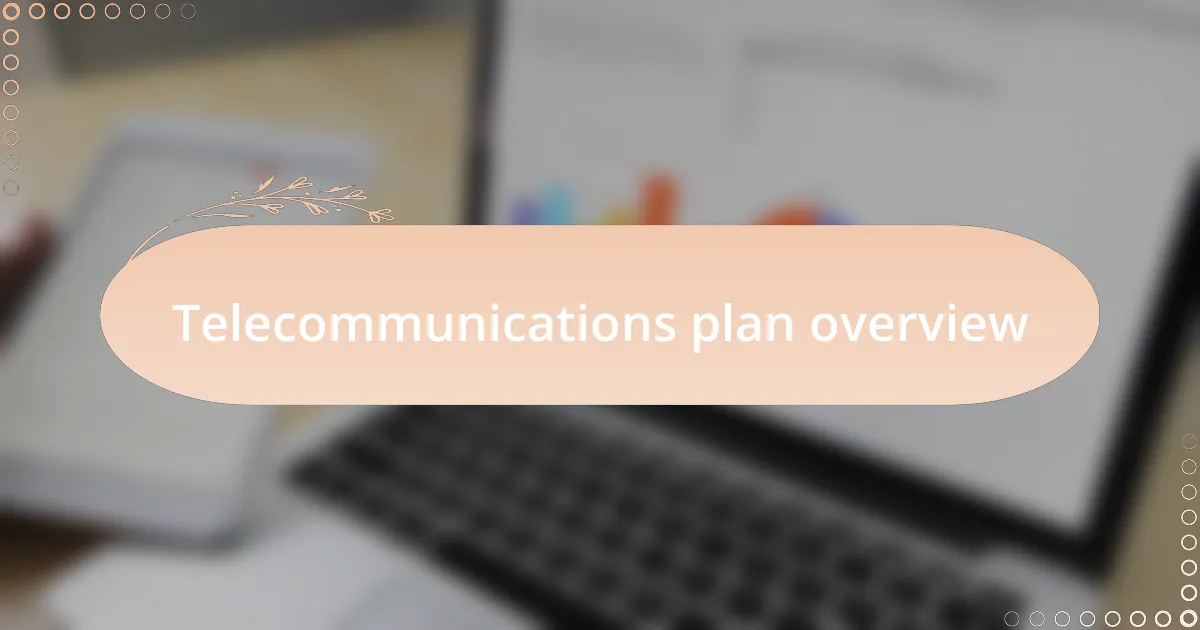
Telecommunications plan overview
Telecommunications plans offer users a variety of options tailored to their needs, whether they prefer flexibility or predictability in their usage. From my own experience, I remember when I was new to mobile plans and chose a postpaid option, thinking it was the best choice for consistent monthly billing. However, I quickly found that my usage fluctuated more than I’d anticipated, leading me to question if I’d made the right decision.
When exploring different plans, it’s essential to consider what fits your lifestyle best. For example, prepaid plans appealed to me during a travel phase because I could avoid the stress of surprise bills while enjoying the freedom to control my spending. Isn’t it reassuring to know you can switch or cancel without major penalties?
Moreover, the telecommunications landscape is continually evolving, with various promotional offers and data options. I find this dynamic environment both exciting and overwhelming. How does one choose what’s right? I like to reflect on my priorities—do I need unlimited data, or am I using my phone more for calls and texts? This introspection often helps clarify my choices.
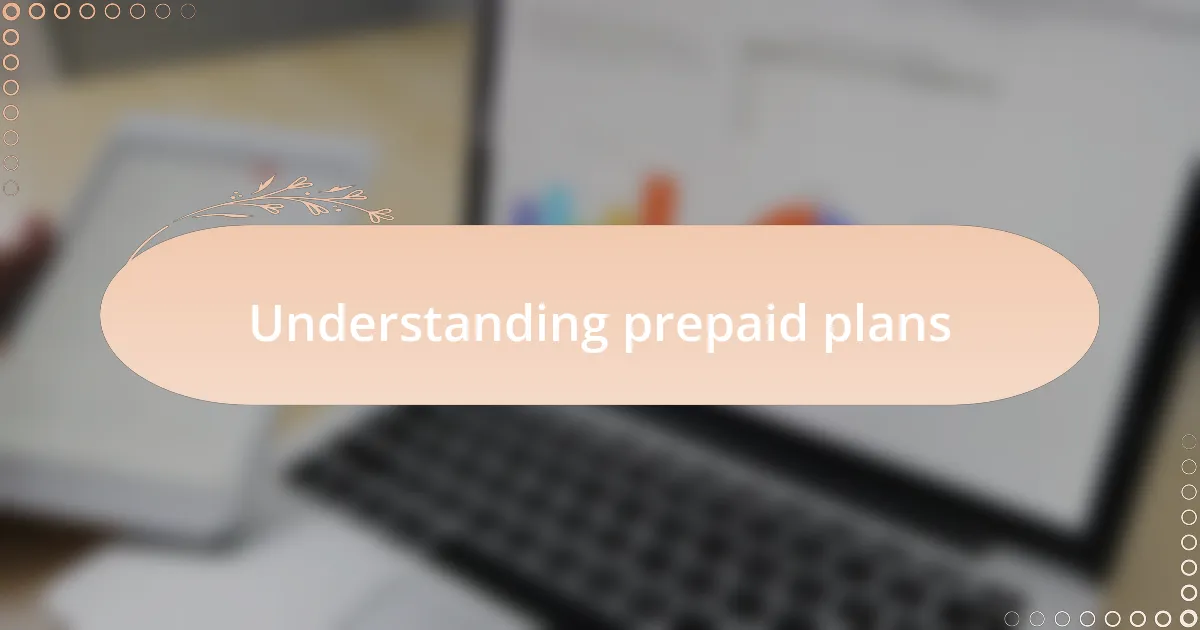
Understanding prepaid plans
Prepaid plans are all about giving you control over your spending. I remember the first time I tried a prepaid plan; I felt empowered knowing I could set a budget and wouldn’t go over it. It’s liberating not to have to track the details of usage each month, and I appreciated the transparency—there’s no guessing on my bill at the end of the month.
One of the standout features of prepaid plans is their flexibility. Once, during a quiet month, I simply didn’t refill my account and let it sit, using my phone less while I focused more on other activities. This kind of adaptability is an essential aspect for anyone whose usage patterns can vary widely. Have you ever felt your mobile usage could spike one month and drop the next? Prepaid options cater wonderfully to that unpredictability.
Moreover, I find the peace of mind that comes with prepaid plans appealing. There’s something comforting about knowing I won’t be hit with unexpected fees or have to navigate a complex billing cycle. I often wonder if more people would embrace this hassle-free approach if they weren’t so accustomed to the postpaid mindset. In my experience, that simplicity tends to resonate with those who want to avoid financial surprises while still enjoying connectivity.
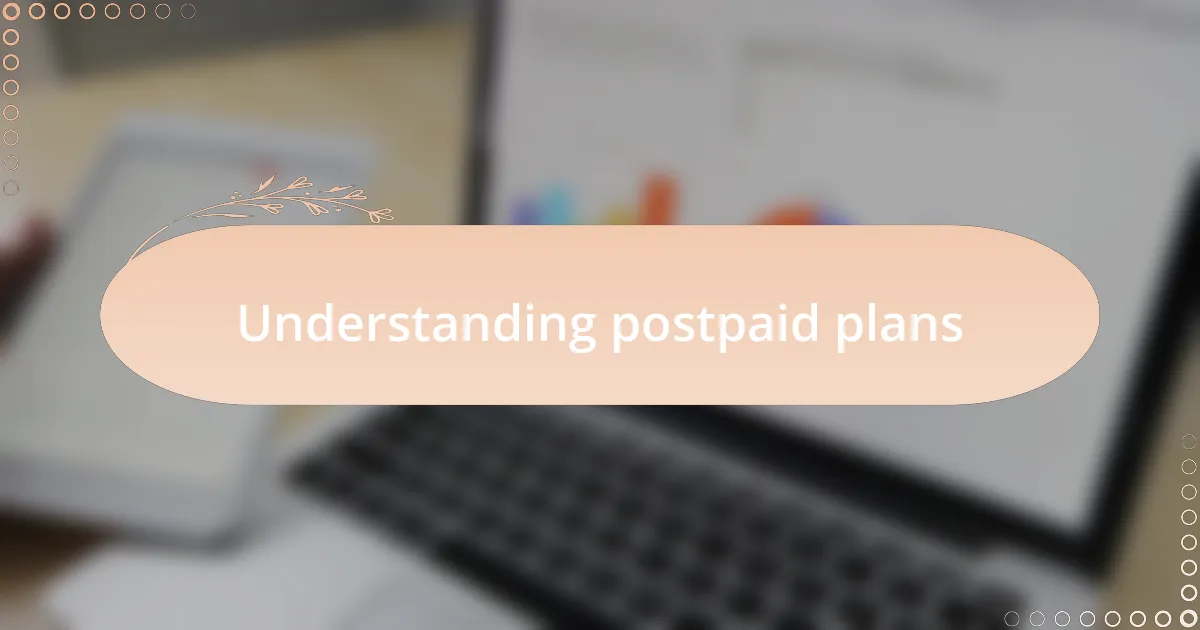
Understanding postpaid plans
Understanding postpaid plans can feel like navigating a complex web of options, but they often provide advantages that align with certain users’ needs and preferences. I vividly recall the shift when I switched from a prepaid to a postpaid plan; it felt like gaining access to a world where data limits and overage charges were part of the past. That security in knowing I could use my phone freely without worrying about running out of balance or exceeding my budget was truly liberating.
What really sets postpaid plans apart for me is the bundling of services—often including multiple lines with shared data, special promotions, and even perks like device financing. I once joined a family plan, and it not only reduced our overall costs but also allowed us to share data seamlessly. Have you ever sat down with your family to discuss tech needs? That conversation opened my eyes to how these plans can foster connection and communication among family members while offering savings.
Then there’s the trade-off with flexibility. I remember feeling slightly trapped by a long-term contract, yet the reliable monthly bill was a comforting constant. It made budgeting easier, as I could plan my finances without the ups and downs of variable costs. Do you think the security of fixed bills outweighs the need for the adaptability of prepaid options? From my perspective, it really boils down to understanding personal usage patterns and how much predictability one prefers in their telecommunications experience.
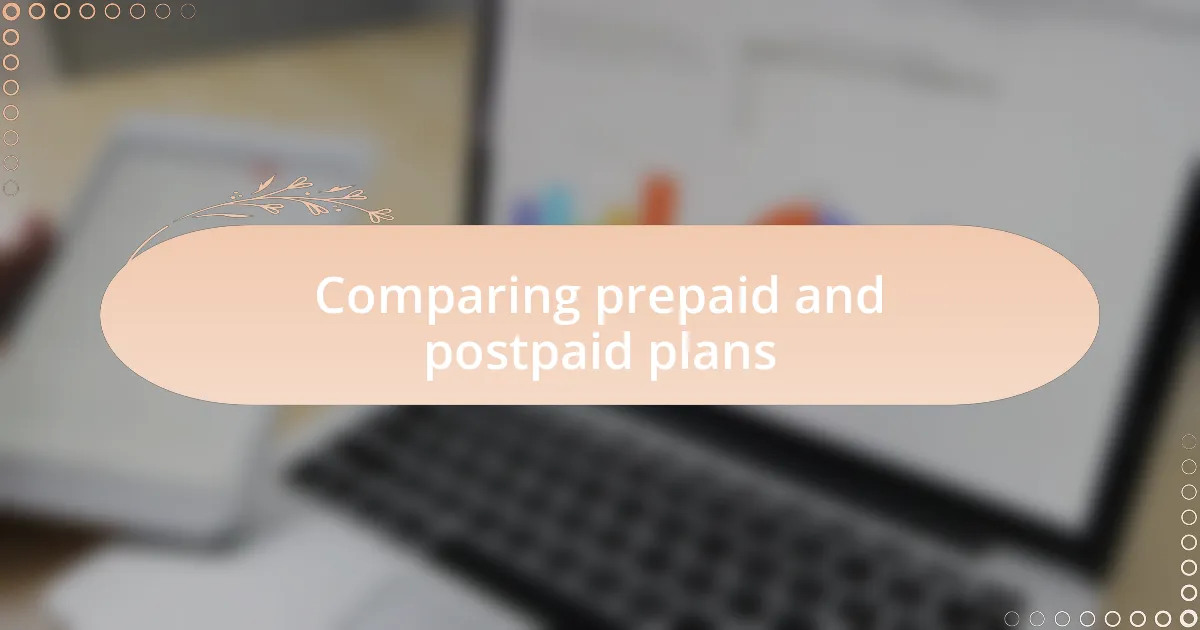
Comparing prepaid and postpaid plans
When comparing prepaid and postpaid plans, I often find myself reflecting on the freedom that comes with prepaid options. There’s something refreshing about not being tied down to a long-term contract. I once tried a prepaid plan during a travel adventure, and it felt liberating to manage my spending without the pressure of a monthly bill looming over me. Have you ever enjoyed that kind of spontaneity in your communication budget? For someone like me who values flexibility, it was a breath of fresh air.
On the other hand, I can’t ignore the benefits of postpaid plans, especially when it comes to data allowances. I remember the first time I hit a generous data cap with my postpaid plan; I felt like I had the world at my fingertips. This is where the comparison gets tricky—prepaid plans might offer better short-term commitments, but postpaid plans often come with perks that can enhance your overall experience. Do you ever find yourself weighing these kinds of trade-offs? It’s almost like a balancing act between immediate control and the long-term rewards of a comprehensive plan.
Ultimately, it’s about personal usage patterns and preferences. I’ve chatted with friends who swear by prepaid plans for their budget-conscious nature, while others appreciate the stability of postpaid arrangements. I think about how my own needs have evolved over time; what once seemed an essential feature might not hold the same weight today. How do you see your own communication needs shifting? Exploring these differences can be a fun exercise in understanding our unique lifestyles.

Advantages of prepaid plans
When I consider the advantages of prepaid plans, the first thing that comes to mind is the control they offer over spending. I remember a time when I was on a tight budget; I could select a plan that perfectly matched my needs without worrying about unexpected charges. Don’t you find it comforting to know exactly how much you’re spending every month?
Another notable advantage is the ease of switching. I once became dissatisfied with my service provider, and with a prepaid plan, I simply walked into a store and chose a new one without any hassle. That kind of flexibility is empowering. Have you ever felt bogged down by contracts that seemed impossible to escape?
Moreover, prepaid plans can be incredibly convenient for international travel or occasional use. I started using a prepaid SIM during my last trip abroad, and it felt liberating to seamlessly communicate without incurring exorbitant roaming fees. The ability to stay connected on my terms, regardless of location, is something that I think every traveler can appreciate. How often do we underestimate the value of easy communication when we’re away from home?
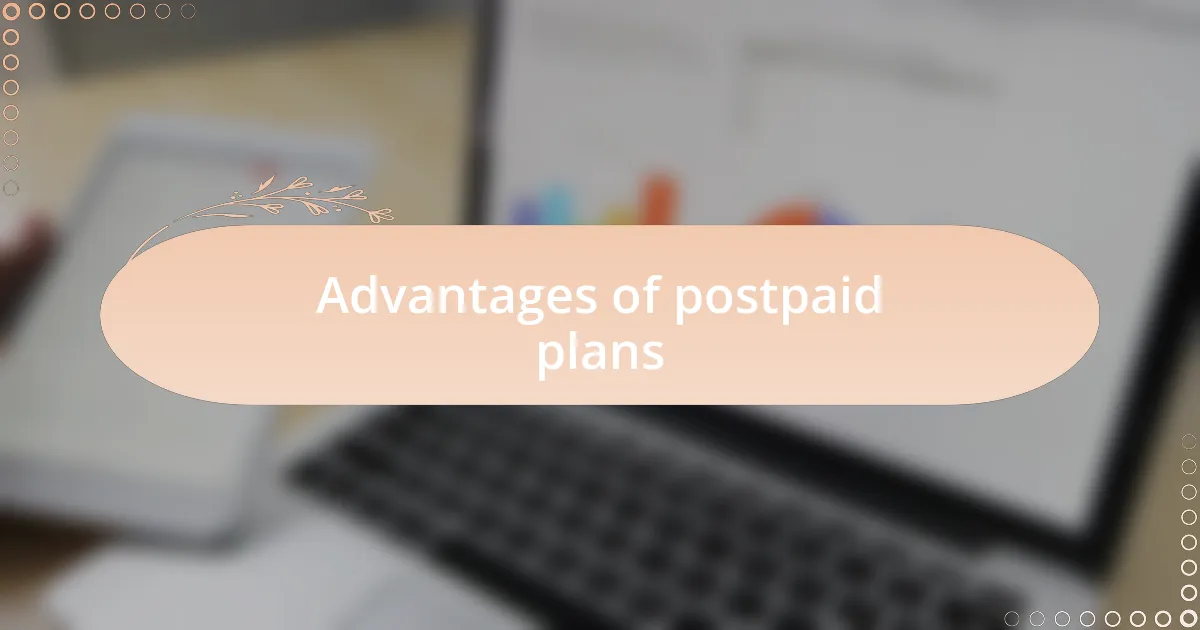
Advantages of postpaid plans
When I think about the advantages of postpaid plans, the first benefit that strikes me is the access to better devices. With postpaid, I’ve often found it easier to upgrade my smartphone through device financing options. It feels amazing to know that I can enjoy the latest technology without needing to pay the whole amount upfront. Have you ever imagined getting your hands on a new phone just by signing a simple contract?
Another significant advantage of postpaid plans is the enhanced customer service. I recall a time when I faced issues with my data plan; my postpaid provider offered dedicated support that resolved my concerns quickly. There’s something reassuring about having that level of service available, don’t you think? It creates a sense of security knowing that I can rely on my provider when I need help.
Additionally, postpaid plans usually come with more generous data limits, which I have found incredibly beneficial. During my college days, I frequently streamed music and videos, and the unlimited data made it so much easier to enjoy content without constantly checking my usage. Doesn’t it feel great to dive into your favorite shows and music without the nagging fear of extra charges?

My personal choice and reasoning
When it comes to my personal choice between prepaid and postpaid plans, I’ve found that postpaid aligns better with my lifestyle. For me, the convenience of a predictable monthly bill is a big deal. I remember the stress of trying to track my prepaid usage; it often felt like a guessing game, and the anxiety of running out of data mid-month was exhausting. Doesn’t it make your life easier when you can set up a budget and know exactly what to expect?
Moreover, my experiences with traveling have solidified my preference for postpaid plans. On a recent trip abroad, I had the luxury of using my phone without worrying about sudden roaming charges, thanks to the international options provided by my postpaid plan. That freedom to navigate new cities and share moments in real-time made the entire experience far more enjoyable—who wouldn’t want that kind of peace of mind?
Additionally, the feeling of being valued as a customer is another reason I lean towards postpaid services. I recall a time when I received surprise perks for being a long-term subscriber, like discounted rates on accessories and even early access to new devices. That sense of appreciation makes me feel more connected to my provider. Isn’t it nice to feel recognized for your loyalty?